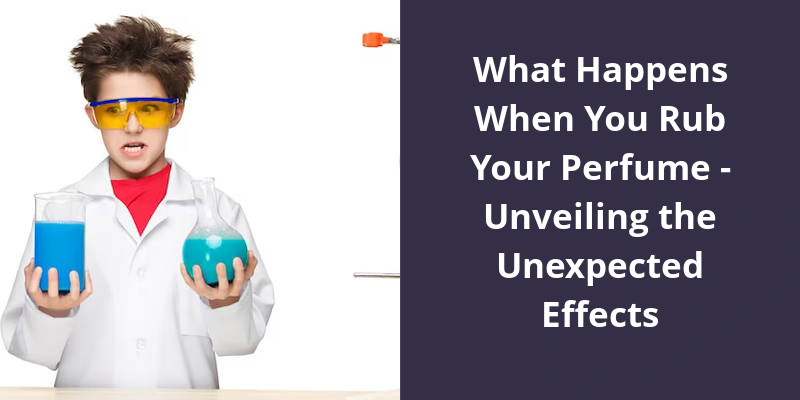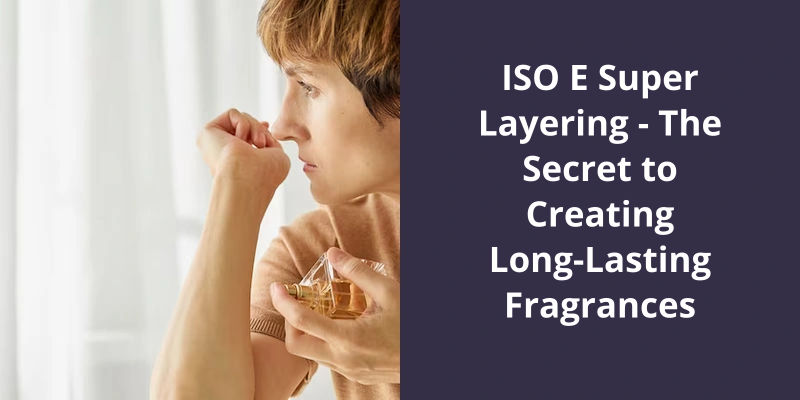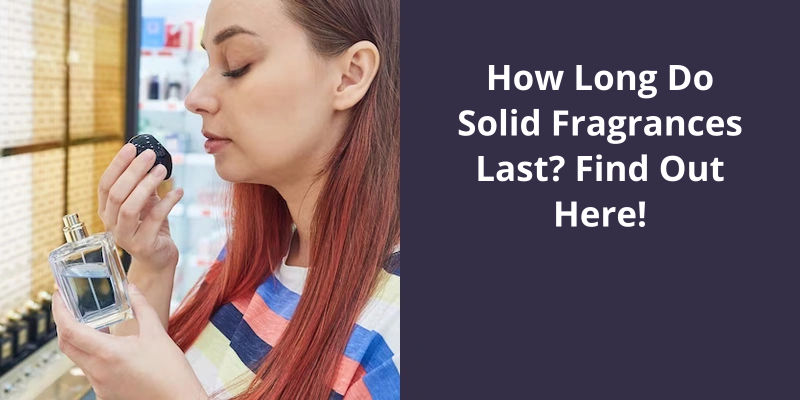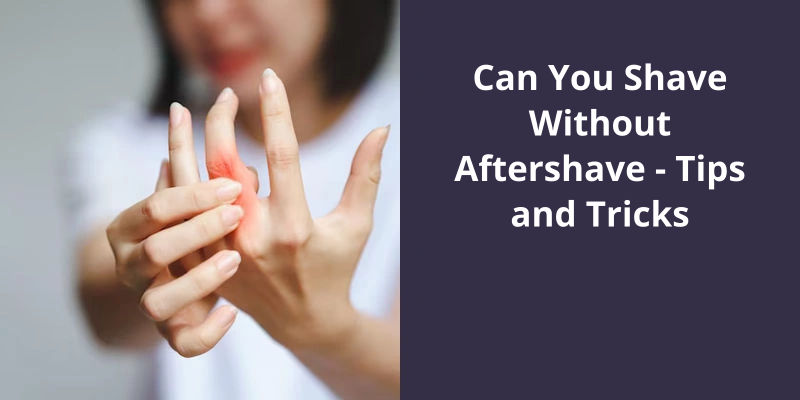Perfume has the power to transport us to distant memories, evoke emotions, and leave a lasting impression. It’s a delicate blend of artistry and chemistry, carefully formulated to create a symphony of scents. But what happens when you rub your perfume? Does it enhance the fragrance or diminish it’s allure? Surprisingly, the act of rubbing your wrists together after applying perfume can have unexpected effects. While it may seem like a natural instinct, it can actually interfere with the delicate balance of the fragrance. Rubbing your wrists together can dull the top notes, the initial scents that captivate our senses. Additionally, this action vigorously mixes the perfume with your natural oils, altering it’s composition and potentially changing the way it smells on your skin. So, if you want to fully experience the true essence of your perfume and ensure it’s longevity, it’s advisable to avoid spritzing and rubbing, allowing each note to unfold naturally on your skin. In doing so, you’ll uncover the hidden depths and unexpected nuances of your favorite scents, revealing a world of olfactory wonders.

Does Rubbing Perfume Make It Last Longer?
When it comes to applying perfume, many people have different methods. Some prefer to spray it onto their wrists and then rub them together, believing that this will help the fragrance to last longer. However, does rubbing perfume really make it last longer? The answer is a resounding no.
Rubbing perfume on your skin has several negative effects on the fragrance. First, rubbing can actually break down the perfumes odorous molecules. These molecules are what give the fragrance it’s unique scent, and when they’re broken down, the scent can become distorted or even disappear entirely. This means that the fragrance you initially sprayed may not be the same as the one you end up with after rubbing it into your skin.
Additionally, when you rub perfume onto your skin, it causes the skin to heat up quickly. This increase in temperature can cause the top and heart notes of the fragrance to evaporate more rapidly. These notes are what give the perfume it’s initial burst of scent, and when they evaporate too quickly, the fragrance may not last as long as intended. So, instead of prolonging the life of the fragrance, rubbing actually shortens it.
If you want to preserve the integrity and longevity of your perfume, it’s best to spritz it onto both wrists without rubbing them together. By doing this, you allow the fragrance to develop naturally on your skin, without the risk of breaking down the odorous molecules or altering the scent. This will ensure that the fragrance lasts as long as possible, allowing you to enjoy it’s scent throughout the day.
In addition to this, it’s also important to consider the quality of the perfume itself. Higher quality perfumes often contain better ingredients and are formulated to last longer on the skin. So, investing in a high-quality perfume may also help to enhance it’s longevity, regardless of how it’s applied.
The Different Notes in Perfume: Understanding the Different Layers of Scent in a Perfume and How They Contribute to It’s Overall Fragrance and Longevity.
- Top Notes: These are the initial scents that are detected when the perfume is first applied. They’re usually light and refreshing, and they evaporate quickly.
- Middle Notes (or Heart Notes): These scents become apparent after the top notes have evaporated. They form the core of the fragrance and are often more complex and longer-lasting.
- Base Notes: These scents are the foundation of the fragrance and emerge after the middle notes have dissipated. They’re typically rich, deep, and long-lasting.
- Dry-Down: This term refers to the final stage of a perfume’s development, which occurs after all the other notes have evaporated. The dry-down can last for hours and is characterized by the lingering scent that remains on the skin.
- Sillage: This is the term used to describe a perfume’s trail or projection. It refers to how far the scent extends when the perfume is worn.
- Longevity: This refers to how long a perfume lasts on the skin before completely dissipating.
- Perfume Pyramid: This is a visual representation of a perfume’s notes, with the top notes at the top of the pyramid, the middle notes in the middle, and the base notes at the bottom.
By gently dabbing your cologne on your wrists and neck instead of rubbing it in, you’ll allow the fragrance to develop and unfold naturally, preserving it’s original composition and ensuring that you experience the intended scent.
What Happens if You Rub Your Cologne?
When it comes to applying cologne, there seems to be a common misconception that rubbing it into your skin will enhance it’s scent. However, this is far from the truth. Not only does it degrade the scent while it’s fresh by forcibly mixing it with your natural oils, but it also alters the way the top notes smell.
The top notes of a perfume are the initial scents that you experience when you first apply it. These notes are often light, refreshing, and delicate. However, when you rub your cologne into your skin, you disrupt the balance of these top notes. The friction generated by rubbing can create heat, which can cause the alcohol content in the perfume to evaporate more quickly, altering the scent and leading to a less desirable experience.
Instead of rubbing, it’s recommended to dab your cologne on your wrists and neck after application. By gently patting or dabbing the cologne onto your skin, you allow it to naturally blend with your bodys chemistry. This way, the fragrance will develop and unfold in a more gradual and harmonious manner, preserving the integrity of the top notes and ensuring a longer-lasting scent.
This can make it difficult to gauge the appropriate amount of cologne needed, resulting in an unpleasant and overpowering experience for both yourself and those around you.
In addition to preserving the fragrance, the act of dabbing your cologne also allows you to control the application better. It enables you to apply the cologne more precisely and sparingly, ensuring that you achieve the desired level of scent without going overboard.
How to Properly Layer Different Fragrances to Create a More Unique and Personalized Scent
- Choose a base fragrance that you love and want to build upon.
- Identify complementary fragrances that will blend well with your base scent.
- Start by applying a small amount of your base fragrance to clean skin.
- Apply a different fragrance, such as a lighter floral or citrus scent, on top of your base fragrance.
- Continue layering with additional fragrances, making sure to consider the intensity and notes of each fragrance.
- Experiment with different combinations to find the perfect balance and unique scent.
- Remember to apply fragrances to pulse points, such as wrists, neck, and behind the ears.
- Allow the fragrances to settle and blend together before making a final judgment on the scent.
- Take note of the combinations you enjoy and the ones you want to avoid for future reference.
What Does It Mean When a Girl Sprays Perfume on Her Ankles?
The act of spraying perfume on ones ankles might seem unusual or even puzzling to many. However, this trend holds a cheeky and perhaps unconventional meaning for those in the know. The underlying reason behind this seemingly quirky behavior is more than just a simple fragrance choice; it’s about keeping things smelling fresh in the bedroom.
By applying the scent to this specific area, it creates a hidden secret that only those who come close enough will discover. It becomes a subtle invitation, a personal and intimate scent that lingers and captivates.
Moreover, the ankles are often overlooked, relatively small and delicate, making them an unexpected canvas for fragrance. This unconventional application challenges conventional norms, highlighting ones unique personality and confidence in making their own choices. The defiance of societal expectations further adds a level of intrigue and mystery to the fragrance wearer.
It becomes a playful, seductive gesture, infused with intention and purpose. It’s a way to ignite passion, enhance intimacy, and unveil unexpected effects. So, the next time you catch a whiff of fragrance lingering from someones ankles, remember that theres more to it than meets the eye – it’s an invitation into a world of sensuality and allure.
Perfume as a Form of Self-Care and Wellness Practice
- Improves mood and mental well-being
- Provides relaxation and stress relief
- Boosts confidence and self-esteem
- Aids in meditation and mindfulness
- Enhances self-expression and creativity
- Creates a sense of identity and individuality
- Elevates self-care routines
- Invokes positive memories and emotions
- Encourages self-reflection and personal growth
- Fosters connection with others through scent
After applying cologne, it sometimes becomes necessary to remove or neutralize the scent. This can be due to personal preference, sensitivity to fragrances, or simply changing your mind about the scent. There are several methods to rub off cologne effectively, allowing you to start fresh with a new fragrance or go about your day without any lingering scent.
How Do You Rub Off Cologne?
How do you rub off cologne? Begin with a light application. Start light with a single spritz on one or two warm locations. Then, give it a moment for the scent to settle. If you notice that the scent seems to fade quickly, choose another hot spot area and spray the cologne there.
Rubbing the perfume isn’t recommended as it can alter the fragrance composition, however, there are alternative methods you can try to enhance the scent. This allows the fragrance to interact with your bodys natural oils and intensifies the scent.
Another technique is to spray the perfume on your wrist and then lightly press your wrists together. This creates a gentle friction that helps to distribute the fragrance without damaging the scent molecules. It’s important not to vigorously rub your wrists together, as this can also alter the fragrance.
In addition to the application technique, choosing the right fragrance can also make a difference in how long the scent lasts. Opt for perfumes with higher concentrations of oils, such as eau de parfum or pure perfume, as these tend to have a longer-lasting effect. Floral, woody, and oriental fragrances also tend to have better longevity compared to citrus or aquatic scents.
Lastly, consider layering your fragrance for a longer-lasting effect. Use complementary scented products, such as matching body lotions or shower gels, to create a more robust scent that lasts throughout the day. Apply the perfume on top of these products to enhance and prolong the fragrance. Remember, less is more, so start with a light application and build up if needed.
How to Choose the Right Cologne for Different Occasions What Scents Are Appropriate for Different Events or Situations?
When it comes to choosing the right cologne for different occasions, it’s important to consider the scent and it’s appropriateness for the event or situation you’ll be attending.
For formal occasions such as weddings, black tie events, or important business meetings, it’s best to opt for a sophisticated and elegant scent. Look for colognes that have woody or spicy notes, as they can create a sense of sophistication and class.
On the other hand, for casual or daytime events, you can choose lighter and fresher scents. Citrus or herbal fragrances are great options, as they offer a more relaxed and youthful vibe.
When attending outdoor activities or sports events, it’s advisable to choose colognes with aromatic or aquatic notes. These scents tend to be refreshing and can provide a sense of energy and invigoration.
Ultimately, the choice of cologne depends on personal preference and how you want to present yourself in a particular setting. Experiment with different scents and see how they make you feel in different situations to find the perfect cologne for each occasion.
In a recent study published in Psychology Today, researchers have provided scientific evidence to support the claim that perfume can indeed arouse a woman. Dr. Winnifred Cutler, a leading researcher in the field of human pheromones, suggests that certain essential oils and blends can create a captivating fragrance that enhances attraction and allure. To delve deeper into this fascinating research, refer to the full study in Psychology Today.
Can Perfume Arouse a Woman?
Can perfume arouse a woman? Yes, and we’ve science to back this claim. According to the leading researcher Dr. Winnifred Cutler, who identified the existence of human pheromones, essential oils and blends can create a lovely fragrance that enhances attraction and allure. This phenomenon isn’t new, as humans have used fragrances for centuries to enhance their natural appeal. However, thanks to modern research, we’ve a better understanding of how perfumes can affect a womans mood and, in turn, her level of arousal.
The researchers found that certain scents, such as vanilla and lavender, can have a calming effect and increase feelings of relaxation and sensuality. On the other hand, spicy and musky fragrances were found to increase arousal levels in women. This suggests that different scents can elicit different emotional and physiological responses, leading to an enhanced state of arousal.
The science behind perfumes ability to arouse a woman lies in it’s impact on the limbic system – the part of the brain responsible for emotions and memories. When a woman applies perfume, the molecules in the fragrance are inhaled and detected by receptors in the olfactory system. These receptors send signals to the brain, where they’re processed and connected to emotional and memory centers.
Furthermore, the act of applying perfume can also be a sensual and intimate experience. The gentle rubbing of the fragrance onto the skin can create a tactile sensation that further enhances arousal. Additionally, the anticipation of wearing a favorite perfume can also contribute to a heightened sense of desire and attraction.
The History of Perfume and It’s Use in Enhancing Attraction
Perfume has a rich history dating back thousands of years. Ancient civilizations in Egypt and Mesopotamia were among the first to use perfume, primarily for religious ceremonies and rituals. Perfumes were made from natural ingredients such as flowers, herbs, and spices.
Over time, the use of perfume evolved and expanded. In ancient Greece and Rome, perfume became associated with luxury and personal grooming. It was believed that wearing perfume could also enhance one’s attractiveness and seductive powers.
Today, perfume continues to be used as a tool for enhancing attraction. The olfactory system, responsible for our sense of smell, plays a crucial role in human attraction. Certain scents can evoke emotions and trigger memories, making them powerful tools for creating a lasting impression.
When you rub your perfume onto your skin, the heat and friction generated from the rubbing process help to release the aromatic molecules in the fragrance. These molecules then interact with your skin’s natural oils, creating a unique scent that’s specific to you.
As you go about your day, the fragrance of the perfume mixes with your body chemistry, creating a personalized scent that can be alluring to others. The right perfume can exude confidence, charm, and sensuality, making it an essential tool for enhancing attraction.
So next time you rub your perfume onto your skin, remember the centuries-old tradition of using fragrance to enhance attraction and create a lasting impression.
Conclusion
In conclusion, it’s evident that rubbing your perfume, despite being a common practice, has negative repercussions on both the initial scent and the overall olfactory experience. By foregoing the act of spritzing and rubbing, perfume enthusiasts can ensure the preservation of the top notes, allowing for a more accurate representation of the fragrance's intended composition. Additionally, the avoidance of excessive contact with natural oils on the skin aids in maintaining the desired aroma, unaltered by unexpected chemical reactions. In essence, refraining from rubbing one's perfume is essential for maximizing the full potential of fragrances and unveiling the unexpected effects in a manner that remains true to the designer's vision.





